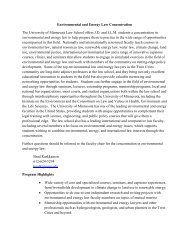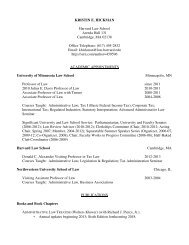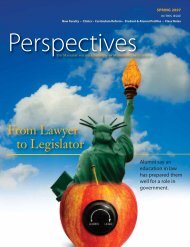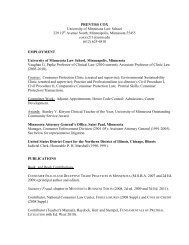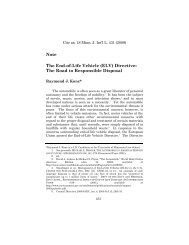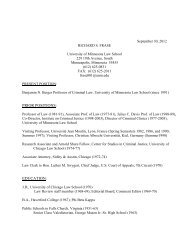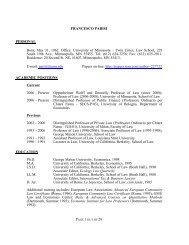Enabling Private Ordering - the University of Minnesota Law School
Enabling Private Ordering - the University of Minnesota Law School
Enabling Private Ordering - the University of Minnesota Law School
Create successful ePaper yourself
Turn your PDF publications into a flip-book with our unique Google optimized e-Paper software.
76 MINNESOTA JOURNAL OF INT’L LAW [Vol. 18:1<br />
or termination in <strong>the</strong> public interest.<br />
Unlike <strong>the</strong> unilateral reaction <strong>of</strong> <strong>the</strong> host State to<br />
contingencies, <strong>the</strong> regulation <strong>of</strong> contracts actually interferes<br />
with contractually negotiated rights and obligations. Contract<br />
regulation could thus be seen as a case <strong>of</strong> opportunistic behavior<br />
that constitutes a violation <strong>of</strong> an umbrella clause, since <strong>the</strong> host<br />
State avails itself <strong>of</strong> its sovereign power to modify or terminate<br />
<strong>the</strong> initial bargain. However, not every regulatory interference<br />
with contractual relationships constitutes opportunistic and<br />
rent-seeking behavior <strong>of</strong> <strong>the</strong> host State. Instead, certain<br />
regulatory conduct solely serves to fur<strong>the</strong>r contract-external<br />
public interests. Such regulation, it is submitted, can be<br />
implemented without constituting a violation <strong>of</strong> an umbrella<br />
clause based on an implicit police power exception.<br />
Fur<strong>the</strong>rmore, in certain limited circumstances States can also<br />
terminate investor-State contracts based on a superseding<br />
public interest. Such an exception for <strong>the</strong> regulation <strong>of</strong> investor-<br />
State contracts can be justified, despite <strong>the</strong> lack <strong>of</strong> a basis in <strong>the</strong><br />
wording <strong>of</strong> most umbrella clauses, with <strong>the</strong> host State’s duty to<br />
act in <strong>the</strong> public interest that has always been recognized under<br />
customary international law and domestic legal systems and<br />
has arguably not been superseded by <strong>the</strong> conclusion <strong>of</strong><br />
investment treaties. It is thus argued that a police power<br />
exception has to be read into <strong>the</strong> interpretation and application<br />
<strong>of</strong> umbrella clauses. Under this exception, <strong>the</strong> regulation <strong>of</strong><br />
investor-State contracts and <strong>the</strong> interference with contractual<br />
rights in <strong>the</strong> public interest is permissible, provided that it does<br />
not impose disproportionate or discriminatory burdens on <strong>the</strong><br />
foreign investor. In some cases this may require <strong>the</strong> payment <strong>of</strong><br />
compensation in order to make <strong>the</strong> interference lawful. Yet,<br />
such interferences will not engage <strong>the</strong> host State’s international<br />
responsibility for unlawful behavior based on a violation <strong>of</strong> an<br />
umbrella clause.<br />
1. The State’s Power to Interfere with Investor-State Contracts<br />
under Customary International <strong>Law</strong><br />
State practice and jurisprudence <strong>of</strong> international courts and<br />
tribunals has ra<strong>the</strong>r consistently recognized that under<br />
customary international law States hold <strong>the</strong> power to interfere<br />
with investor-State contracts in <strong>the</strong> public interest and cannot<br />
contract away this power. Thus, in <strong>the</strong> Oliva Case <strong>the</strong> Italian-<br />
Venezuelan Claims Commission considered that <strong>the</strong> termination



